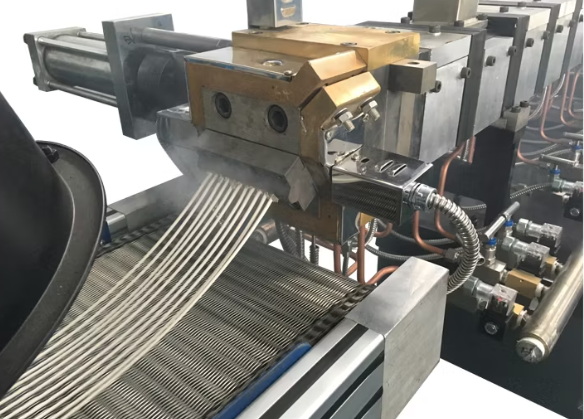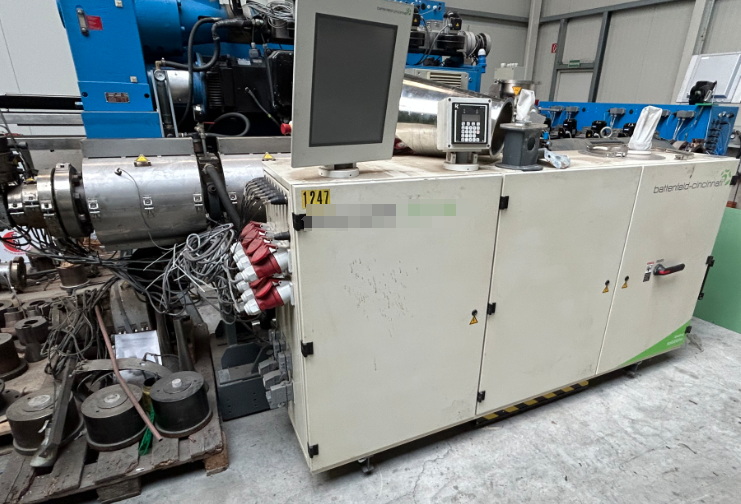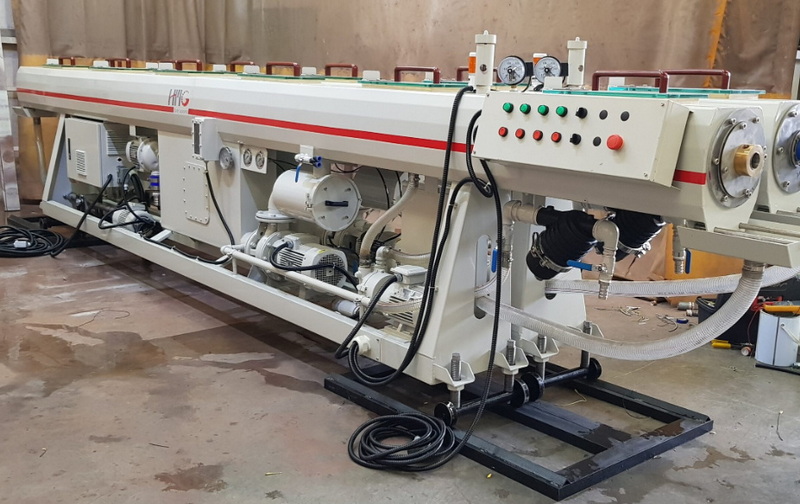Content Menu
● Introduction to Plastic Extrusion Machinery
>> Types of Extruders
● Key Factors to Consider When Buying Plastic Extrusion Machinery
>> 1. Capacity and Output
>> 2. Machine Type and Material Compatibility
>> 3. Quality and Reliability
>> 4. Energy Efficiency
>> 5. Maintenance and Support
>> 6. Cost and Return on Investment (ROI)
● Quality Control Measures
>> Monitoring Process Parameters
>> Use of Sensors and Instrumentation
>> In-line Quality Inspection Methods
>> Automation in Quality Assurance
● Plastic Extrusion Machinery Manufacturers in China
>> YAOAN PLASTIC MACHINERY CO., LTD
>> USEON
● Benefits of Partnering with Chinese Manufacturers
● Challenges and Solutions
● Conclusion
● Frequently Asked Questions
>> 1. What are the key factors to consider when selecting plastic extrusion machinery?
>> 2. How can I ensure the quality of plastic extrusion machinery from China?
>> 3. What role does automation play in quality assurance for plastic extrusion?
>> 4. What are some common quality control measures in plastic extrusion?
>> 5. How do I maintain plastic extrusion machinery to minimize downtime?
Purchasing plastic extrusion machinery from China can be a cost-effective strategy for many businesses, but ensuring the quality of these machines is crucial for maintaining production efficiency and product quality. This article will guide you through the essential steps to guarantee quality when buying plastic extrusion machinery from China.

Introduction to Plastic Extrusion Machinery
Plastic extrusion machinery is used to create a wide range of plastic products, from pipes and profiles to films and sheets. The process involves melting plastic pellets and forcing them through a die to achieve the desired shape. The machinery can vary significantly in terms of complexity, size, and functionality, depending on the specific application.
Types of Extruders
1. Single-Screw Extruders: These are the most common type, suitable for processing a wide range of thermoplastics. They are cost-effective and easy to maintain.
2. Twin-Screw Extruders: These offer better mixing capabilities and are ideal for processing materials that require high mixing intensity, such as PVC and rubber compounds.
3. Co-Rotating and Counter-Rotating Extruders: These are variations of twin-screw extruders, each with unique advantages in terms of mixing efficiency and material handling.
Key Factors to Consider When Buying Plastic Extrusion Machinery
1. Capacity and Output
Ensure the machine's production capacity aligns with your business needs. Consider factors such as the type of material being processed and the desired output rate. For instance, if you are producing PVC pipes, you need to ensure that the extruder can handle the required volume and maintain consistent quality.
2. Machine Type and Material Compatibility
Choose a machine that is compatible with the specific plastic materials you plan to use. Different materials require different types of extruders based on their melting points and viscosities. For example, processing PET requires a machine capable of handling high temperatures and viscosities.
3. Quality and Reliability
Opt for machinery from reputable manufacturers known for producing high-quality equipment. Check for industry certifications like ISO9001 and CE, which indicate adherence to international quality standards.
4. Energy Efficiency
Select energy-efficient models to reduce operational costs and environmental impact. Features like advanced control systems and optimized motor drives can significantly improve efficiency. Energy-efficient machinery not only saves on electricity bills but also contributes to a more sustainable production process.
5. Maintenance and Support
Ensure the manufacturer provides adequate maintenance support and spare parts availability. Regular maintenance is crucial for minimizing downtime and extending the lifespan of the machinery. Look for manufacturers that offer comprehensive after-sales services, including training for operators and prompt technical support.
6. Cost and Return on Investment (ROI)
While cost is important, consider the long-term ROI. A more expensive machine might offer better efficiency and durability, leading to higher savings over time. Calculate the total cost of ownership, including maintenance, energy consumption, and production efficiency, to make an informed decision.

Quality Control Measures
Quality control is essential to ensure that the final products meet the desired standards. This involves monitoring process parameters like temperature, pressure, and speed.
Monitoring Process Parameters
- Temperature Control: Maintaining precise temperatures is crucial for consistent product quality. For example, in HDPE extrusion, temperatures typically range from 180°C to 220°C. Incorrect temperatures can lead to defects such as warping or brittleness.
- Pressure Control: Consistent pressure ensures uniform material flow and density. Variations should be minimized to avoid product defects like uneven thickness or bubbles.
- Speed Control: The extrusion speed affects both output rate and product quality. It must be adjusted based on the material and product specifications to prevent issues like stretching or sagging.
Use of Sensors and Instrumentation
Sensors and instrumentation play a vital role in accurately measuring and controlling extrusion parameters.
- Temperature Sensors: Devices like thermocouples provide real-time temperature data, allowing for immediate adjustments to maintain optimal conditions.
- Pressure Gauges: These monitor pressure within the extruder barrel, ensuring consistent material density and flow.
- Flow Meters: These measure the material flow rate, critical for maintaining consistent extrusion speed and dimensional accuracy.
In-line Quality Inspection Methods
In-line inspections allow for real-time monitoring and adjustments during the extrusion process.
- Visual Inspection Systems: Advanced camera systems detect surface defects like cracks or irregularities, enabling immediate corrective actions.
- Ultrasonic Testing: This non-destructive method detects internal flaws or variations in material density, ensuring that only high-quality products reach the market.
- Laser Micrometers: These measure the dimensions of extruded products with high accuracy, ensuring compliance with specifications.
Automation in Quality Assurance
Automation enhances efficiency and accuracy by integrating sensors, control systems, and robotic inspection.
- Robotic Inspection: Automated robots perform detailed inspections faster and more accurately than manual methods, reducing human error and increasing throughput.
- Automated Process Control: Control systems adjust process parameters in real-time based on sensor inputs, maintaining optimal conditions for consistent product quality.
- Data Logging and Analysis: Automation systems collect and analyze data to optimize machine utilization, predict maintenance needs, and improve overall production efficiency.
Plastic Extrusion Machinery Manufacturers in China
China is home to numerous reputable plastic extrusion machinery manufacturers. Companies like YAOAN PLASTIC MACHINERY CO., LTD and USEON are known for their high-quality equipment and comprehensive after-sales support.
YAOAN PLASTIC MACHINERY CO., LTD
This company has been recognized with several honors from the Chinese government and holds certifications like ISO9001 and CE. They specialize in a wide range of plastic machinery, including pipe and profile machines. Their commitment to quality and customer satisfaction makes them a trusted partner for businesses worldwide.
USEON
USEON offers tailored solutions for specific materials and production needs. They are known for their reliable and efficient machinery, making them a preferred choice among manufacturers. Their expertise in customizing machinery to meet unique requirements helps businesses optimize their production processes.
Benefits of Partnering with Chinese Manufacturers
Partnering with Chinese manufacturers offers several benefits:
- Cost-Effectiveness: Chinese manufacturers often provide competitive pricing without compromising on quality.
- Innovation: Many Chinese companies invest heavily in R&D, offering cutting-edge technology and innovative solutions.
- Global Reach: Chinese manufacturers have a strong presence in the global market, providing access to a wide range of products and services.
Challenges and Solutions
While purchasing from China can be beneficial, there are challenges to consider:
- Communication Barriers: Language differences can complicate communication. Working with manufacturers who have English-speaking staff or using translation services can help.
- Quality Control: Ensuring quality can be challenging due to distance. Regular inspections and partnering with reputable suppliers mitigate these risks.
- Logistics: Shipping machinery internationally can be complex. Working with experienced logistics providers ensures timely and safe delivery.
Conclusion
Ensuring quality when buying plastic extrusion machinery from China involves careful consideration of several factors, including machine type, material compatibility, quality and reliability, energy efficiency, maintenance support, and cost. Partnering with reputable manufacturers and implementing robust quality control measures are essential for achieving high-quality products and maintaining operational efficiency.

Frequently Asked Questions
1. What are the key factors to consider when selecting plastic extrusion machinery?
When selecting plastic extrusion machinery, consider factors such as machine type, material compatibility, production capacity, quality and reliability, energy efficiency, maintenance support, and cost.
2. How can I ensure the quality of plastic extrusion machinery from China?
Ensure quality by choosing reputable manufacturers, inspecting machinery before purchase, and implementing robust quality control measures during production.
3. What role does automation play in quality assurance for plastic extrusion?
Automation enhances quality assurance by integrating sensors, control systems, and robotic inspection to improve efficiency and accuracy in real-time.
4. What are some common quality control measures in plastic extrusion?
Common quality control measures include monitoring temperature, pressure, and speed, using sensors and instrumentation, and implementing in-line inspection methods like visual inspection and ultrasonic testing.
5. How do I maintain plastic extrusion machinery to minimize downtime?
Regular maintenance involves inspecting components, calibrating sensors, lubricating moving parts, and ensuring timely replacement of worn-out parts.






















